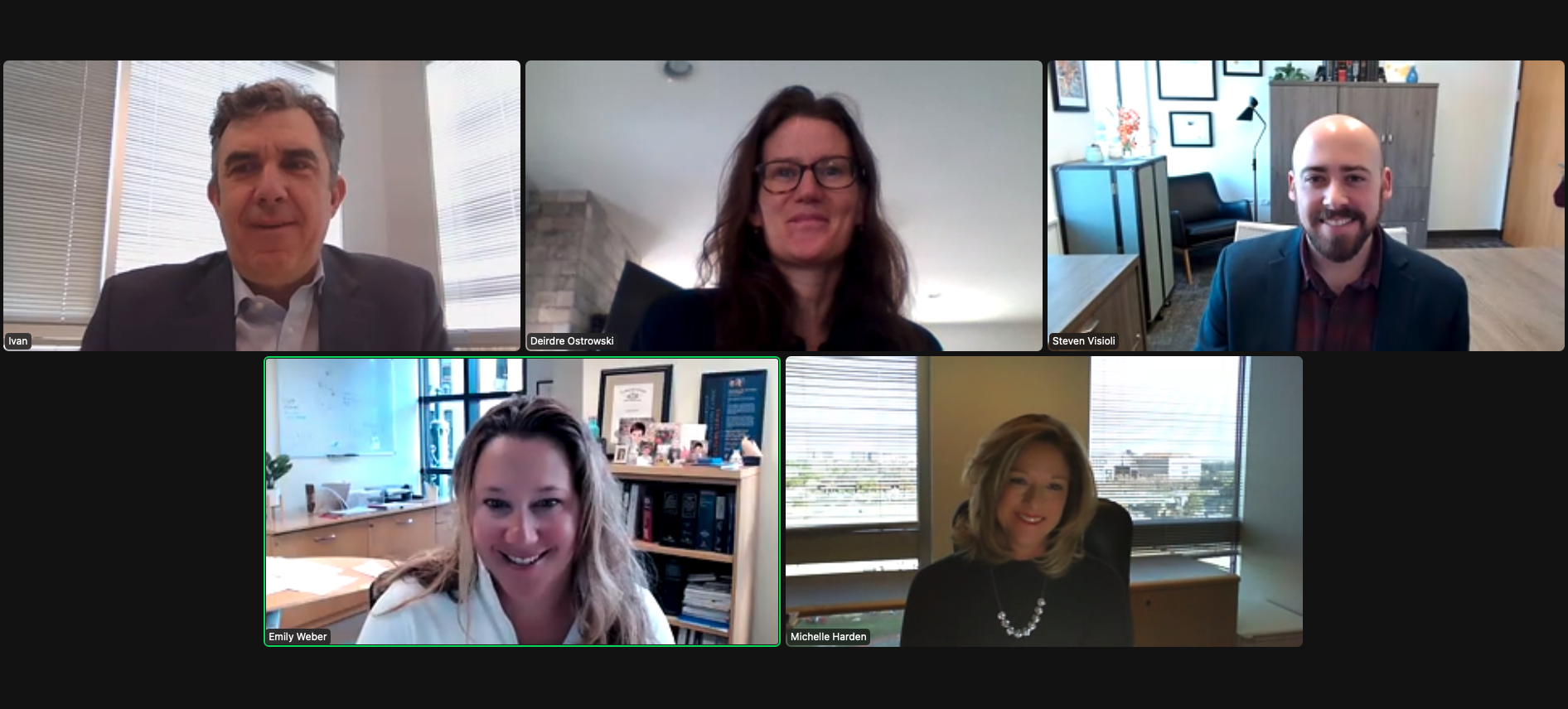

Over the past two years, fundamental changes to the practice of law have altered the everyday management of firms large and small. Three things seem to be lingering issues — culture, COVID and compensation.
According to our roundtable participants, Ivan Sarkissian of McConaughy & Sarkissian, Deirdre Ostrowski of Keating Wagner, Steven Visioli of BAM Family Law, Emily Weber of Foley & Lardner and Michelle Harden of Messner Reeves, these issues may be here to stay in 2023.

While COVID surges and ebbs, concerns from firm leadership about communicating firm culture appear to be a long-lasting issue post-pandemic. Maintaining and conducting critical law practice training while being virtual has also proven to be a thorn in the side of firm management.
Feeding into larger staffing concerns, including increasing competition from coastal firms, local law firm leadership expressed new and complex compensation issues — which may not even be focused on pay alone. Roundtable participants noted a growing need to provide work-life balance, further hampering a desire to provide robust in-person training.
The transcript below has been edited for clarity and length. Check out the full edited transcript here.
SARKISSIAN: What’s dominated our operation in 2022 has been dealing with staff. And I think the experiences of smaller firms compared to larger firms [have] been different. From our perspective, we’ve been creative in trying to both recruit new people and replace people, and obviously do everything we can to keep our quality employees happy, and doing some things that we’ve never had to do before in order to do that.
WEBER: We have 1,100 attorneys, but I think that we have probably a lot of the same challenges that you have. We were recruiting for a litigation secretary and it took us months. I like to think our compensation and our benefits are pretty good. But it still took us forever. The philosophy, at least of our firm, is that you need to be in the office generally. And I definitely agree with that. Our staff gets one day a week they can work from home. I’d be curious to see what other people [are experiencing].
SARKISSIAN: We came back to work May of 2020. And working from home is the exception, not the rule. By far.
OSTROWSKI: I think for us it’s more of a hybrid. We went back to work really quickly just like Ivan did. We were back by May because we found that you really need team collaboration; it’s not the kind of job that you can [do] from home. People were spreading out their days. They’re ending at seven because they’re taking a walk at three and they’re taking their kids to school. And it just didn’t fit with the type of workday that we have. But I think they also found that there were a lot of upsides to having some time at home. So now we’re a little more flexible. If it’s a snow day, if it’s a blah, blah, blah, day, it’s okay if you’re going to work from home. If you have disclosures due and you’re just bombarded with work, and you want to take Tuesday and do them at home because it’s less distracting, we’ll be open to that.
HARDEN: We’re probably at the other end of the spectrum. We continue to let people decide in large part whether or not they want to be in the office. I would say the exception to that is younger attorneys. Because I don’t know how on earth you train as a new lawyer over Zoom. We just moved our main office for the first time in 20 years. The policy we put into place was if you are coming into the office four days a week, you’re going to have an office, but otherwise, it’s going to be a hoteling office. And we’ve gone from people saying “I want to work remote,” to now everybody wants to be together and we’re out of offices. But we have a fair amount of our staff who moved out of state during the pandemic. And thus far, we’ve allowed them to stay where they are and have done pretty well with that.
VISIOLI: From the smaller firm perspective, we’ve definitely tried to give a lot of autonomy to our attorneys in deciding if they want to work from home or work from the office. I think as you’ve probably all experienced on a bigger level, that gets a little bit frustrating when there’s a lot of working from home, then you have empty offices and you want to get that team feeling where everyone’s talking strategy together. Now doing so requires a lot more [effort]. It’s herding cats to make sure that someone’s not on a walk at home at the same time you want to have a case meeting. We’ve also grown a lot in the past year. We’ve added four new attorneys — which is a lot for us. With our new staff, it’s been tough because I think the younger generation of attorneys wants more than anything to be able to work from home. And it’s very curmudgeon-y of me to say, “okay, yeah, but once you figure out what you’re doing — until then, let’s be in the office as much as possible.” But flexibility is super important because you know, even if people aren’t sick, if there’s been COVID exposures, if there’s a snow day, if there’s anything else, [but] trying to to get the same work product from home you can get from the office has been a goal that it’s been hit or miss for us, I’d say.
WEBER: We just had our all-attorney retreat in Orlando this past week. And they had [a] panel and it was three clients or GCs of big companies. And at the very end — this was not a planted answer, I should say — they said, “What would you tell the young attorneys if you could tell them one thing?” And granted, this was for the junior attorneys. But two of the three said, “One thing I’d say is, it’s a mistake to work remotely in your junior years.” And that was the greatest gift we ever got. Because it didn’t come from us.
SARKISSIAN: I think, especially when you’re trying to find the right people to hire, that becomes more of a challenge. Being able to train younger attorneys is crucial. Certainly, for our practice, which is so focused on litigation. I don’t know how you try and explain to somebody how to be a litigation attorney over a computer screen.
OSTROWSKI: How do you find that balance though — I haven’t figured this out yet. I do think young attorneys need to be in the office, they need to be trained, they need to see how to deal with the phone calls, how to deal with the court appearances, motions, writing. But they have a new concept or narrative they’re telling themselves and their peers that they want to have quality of life, that they want to practice in a different way. And I don’t know how to get the two generations to be on the same page — to give [the younger attorneys] some of their autonomy of this lifestyle they envision for the practice of law. We don’t all have to work 80-hour workweeks; we can have a better balance. But they also can’t be completely absentee attorneys. I don’t know how to bridge the two worlds yet.
SARKISSIAN: What I try and stress is the importance of representing the client and what the client’s needs are. That, as a professional, you can want to have work-life balance, and you can want to have quality of life. But if you’re a litigation attorney assigned to represent a client, the needs of the case and the needs of the clients have to take priority. They can’t be shoved aside because of quality of life. I just don’t think that works in our firm. Quality of life is a balance. And the nice thing about litigation is if a case settles or if a case gets bumped and you have all the time on your calendar, take advantage of it, use it, but trying to stress quality life when cases are in dire need of attention doesn’t really work out.
HARDEN: My kids were school-aged when I finished law school and I was a sports mom and was able to have that work-life balance 20 years ago or close to it. I think a lot of that has to do with teaching [younger attorneys] to put things on calendars and plan ahead of time. We’re allowing people to work more flexible hours and fewer hours. And the one piece of it that has been interesting to me is that they’re not as concerned about the compensation as they are about work-life balance. They’d rather work fewer hours [and] get paid less.
SARKISSIAN: That’s the other challenge — smaller firms competing with bigger firms. If you don’t pay the associates, even if they come in talking about [how] they want work-life balance, pretty soon they’re going to want money. And Emily will come along with a big checkbook and offer your associate that you’ve trained for three years a significant increase in salary. And then you’ve got a very difficult decision to make.
WEBER: I think that’s a good point about the compensation — because these associate salaries keep going off based off of New York billable hours, [it’s] not sustainable in Colorado. That is a struggle that is not just Denver, but a lot of our non-coastal offices are having in terms of this work-life balance. You want to get paid this certain amount, but then are you working that amount? I do find it’s been interesting in the work-life balance, especially with the attorneys versus the staff, because let’s face it, partners have been able to flex with their schedule for a long time. They go in and out. They’re doing all sorts of stuff. Our litigators, we won’t see them for weeks at a time because they’ll be often [at] trial. Our transactional people are a little bit more in the office every day. I do think there is a degree of being able to manage your life, and in beautiful Colorado, there’s a million things to do other than work. And I think that only comes out with time for the associates and the partners that they work with, if their partners are cool about things or not.
VISIOLI: I think to Ivan’s point, whether or not partners are cool with things a lot of times depends on whether or not the clients are cool with things. Especially when you’re litigating. You’ve got people with their money and emotion tied into whatever you’re litigating about. It’s been a separate challenge than keeping associates happy with either money or flexibility. To get them to really take ownership of cases where you might not see your client in person during the entire representation.
OSTROWSKI: I think that’s a really good point, Steven. It’s really important for our clients to feel like they’re heard or [that] their attorney’s paying attention to them — it’s just their first time they’re in a litigation-type setting [and] they’re not a business client. But we’re also starting to make sure we make in-person appointments because we realized that there are some clients we signed up during COVID that I’ve never even met in person. And it helps your staff, and the lawyers be more present once you’ve met the family or whomever your client might be.

